Video PlayerClose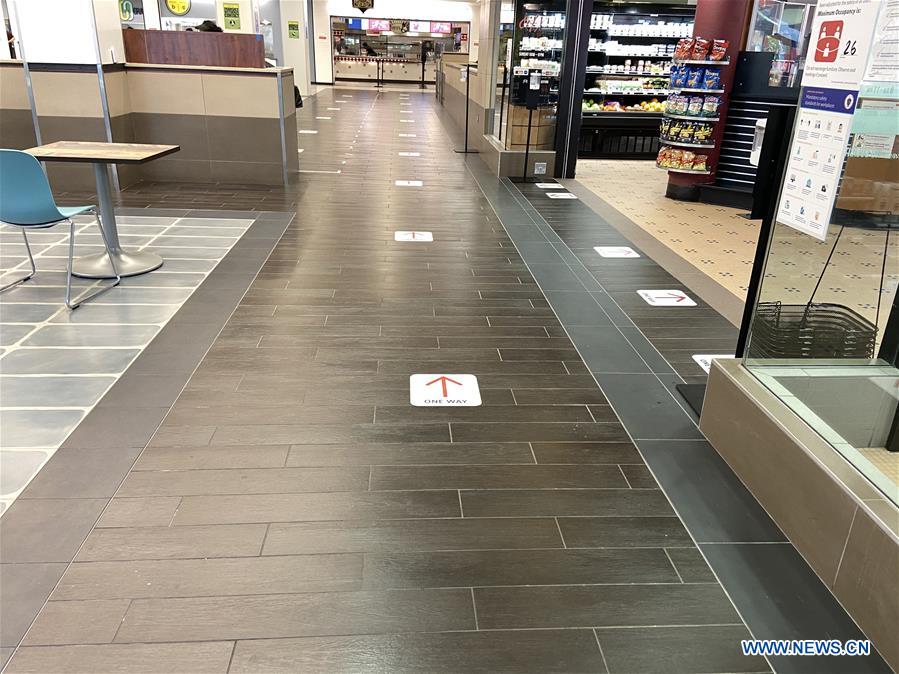 聽
聽
Directional signs are seen on the floor of a dining area at Boston University, Boston, Massachusetts, the United States, on Sept. 4, 2020. While many U.S. colleges including its prestigious neighbor across the Charles River, Harvard University, have started the fall semester fully online, Boston University (BU) found itself going the extra mile to ensure all the students who chose to live on campus under a hybrid learning mode are safe and healthy. (Photo by Wu Tongyangzi/Xinhua)
by Wu Tongyangzi
BOSTON, the United States, Sept. 8 (Xinhua) -- While many U.S. colleges including its prestigious neighbor across the Charles River, Harvard University, have started the fall semester fully online, Boston University (BU) found itself going the extra mile to ensure all the students who chose to live on campus under a hybrid learning mode are safe and healthy.
The university, with a total student population of 35,472, including a first-year class of 3,100 students, has made it very clear that its top priority is students' safety.
"The school is working to make students' life on campus as rewarding and inspiring as ever, and putting in place new safety precautions to support the community's well-being," said Kenneth Elmore, the university's dean of students, in a letter to students.
The school has a four-phase reopening strategy implemented for COVID-19 epidemic prevention covering every aspect of campus life -- from transportation to classroom spacing, from dining to testing.
The first two phases, which had already been completed from May to July after the school reopened its campus in late May, focused on reopening essential services, including clinics, research facilities, and gradually having dental and medical workers coming back to work.
Phase three and four, which started in August and were designed to last through the fall semester, aim at ensuring students' safety on campus and resuming teaching in-person.
ABUNDANT PRECAUTIONS
Under the school's new guidance for on-campus life, every student was issued a personal QR code tracing the student's health condition. Students who are frequently on campus are required to fill out a daily symptom screening survey. COVID-19 testing is also mandatory for students at least once a week.
All students and faculties with conditions prone to COVID-19 will be directed to a select testing location. Since July 27, the school has reported 78 positive cases, a 0.11 percent positive rate among all tested students and faculties.
To combat the pandemic and ensure social distancing, BU reduced the total capacity of its shuttle buses. Passengers will be seated separately with markers showing which seats are available.
In response to passenger capacity cutbacks, the school has offered a more frequent bus schedule to reduce the waiting time for students and faculties. BU also started the new shuttle operation within the Charles River campus.
The university is developing new essential physical structures, strategies, everyday tasks, and approaches for students to learn and live comfortably on campus. A unique feature on campus that's hard to miss is the directional signage. Signs that show pedestrians the directions and markers to show where to stand and wait in line.
The capacity reduction is implemented from classrooms to the elevators and even the bathrooms. The student union has been rearranged, so each seat only allows one student to sit and eat.
Inside each classroom, limited tables and chairs are placed in specific positions, making each classroom bizarrely spacious.
STUDENTS' MIXED APPROACHES
The school's efforts to make students feel safe on campus did not go unnoticed as many students who chose in-person classes showed confidence in warding off the coronavirus while still enjoying a vigorous learning environment.
However, the students' attitudes toward their personal choices under the hybrid learning mode are mixed. Some ventured to take most of the classes in-person, while some others chose to come back to enjoy a on-campus life but opted out of in-person classes, and still there are many students who have decided to study remotely from home.
"I feel safe in the classroom," said Runci Li, a 22-year-old Chinese master student studying media science at BU.
"Everywhere I go on campus, there are signs and markers to reinforce social distance. The seats in the library are also spaced out," said Li.
Li chose to take her class in-person. "I feel that the professor will focus first on the students in the classroom. When I was doing online classes, I always felt left out. So taking classes in-person is more efficient for me."
Ruotian Bai, a Chinese international student studying Public Relations, is planning to take all her classes in person. "I'm glad BU has reopened," said Bai after taking her first in-person class of this semester, "We have to keep our masks on in classrooms, and teachers are very strict about social distancing policies."
Taking in-person class during a pandemic is not as easy as one expected. Bai is having a second thought after her first in-person experience. "It's a three-hour class, you might want to drink some water at some point, but we have to do it outside of the classroom," said Bai. "I had to go to the hallways, and I just don't feel as safe drinking in a public place like that."
"I'm taking most of my classes in-person for now." said Bai, "so far, I feel safe and comfortable being the only couple of students in my classroom. It helps me to focus on the subjects." This is Bai's last semester at BU.
When it comes to deciding between in-person or remote, each student has a plan that fits best for his or her own studying habits and major. While students like Bai and Li prefer taking classes in-person, many chose to take classes remotely.
Rebecca Owen, a senior Public Relations student from Pennsylvania, moved back on campus in early September. She is living with one roommate in an on-campus apartment. When asked about her new campus life, she said: "This year is very different." Owen's dorm meetings are held online; most public areas have been closed or reduced capacity.
Adapting to a new campus lifestyle, she has decided to take her class online. "My classes are all three hours long, so I do not feel safe being in a room for that long." "Plus, I can do all I need for my classes on my computer."
However, moving back to campus has always been the plan for Owen. "I really love to be back in the cities, and the school is doing a good job keeping us safe."
Hailey Mckee, a second-year master student in Public Relations from Tennessee said: "My classrooms have been equipped with cameras and microphones for professors to use when connecting with online students during class, and there are certain capacities for each room that are clearly marked on their exteriors wall."
Mckee is taking her classes remotely yet moved back to Boston as well. "Seeing these changes to my classrooms' infrastructure has certainly made me feel that BU is taking the health and safety of our academic community seriously."
Although classrooms seemed empty, students appreciated the school's effort.
Olayinka Sarayi, a second-year master student in Public Relations, is now taking her class fully remote at home in New York City. "I have seen some of the measurements and precautions the school is taking to ensure the safety of faculty and students. I feel like the school is trying to make this semester work as best as it can under these conditions."
However, changes could happen at any moment. BU has announced its privacy policy regarding students' testing results. Professors will not be notified if a student has been tested positive for COVID-19.
"I'm afraid that after a while, people won't take this so seriously anymore." Li expressed her concern, "When more students decide to join in-person sessions, the danger raises for us to be infected, I think I will take my classes online at that time," Li's plan is still not completely settled.
"Many undergraduates would prefer to socialize with their friends, and they all live in the dorms, if the school is not transparent about the testing results, it will depend on each individual to be honest," said Bai.
"This is just the beginning," said Bai, "I'm not sure if there is an efficient way to keep all students in control." Bai was worried that maybe schools like BU will be shut down again due to campus breakout.
Mckee shared similar concerns regarding this semester's campus life: "My biggest concern is others potentially not taking health and safety protocols seriously. No matter where we are -- on campus or not -- our actions have consequences, so everyone needs to follow guidelines that keep our communities safe."
SCHOOL'S RESOLUTION TO BE STRICT
As the COVID-19 cases continue to grow in the United States, and some colleges were forced to shift to all online teaching just a few weeks after opening a hybrid fall semester, BU is very serious about enforcing its antivirus guidelines.
In a letter to all the students, the Dean of Students Kenneth Elmore made it clear that students host or attend any large party or those who violate state guidelines on in-door gatherings of over 25 people will be suspended immediately.
The school is also reminding students to complete their daily symptom check surveys by sending out daily emails and text messages. The dean's office will notify students who failed to meet the weekly testing and daily symptom check requirements.
One penalty for a non-compliant student is student ID suspension. Students will not be able to use their student ID to enter buildings and will have limited access to school facilities.
A New York Times survey of more than 1,500 American colleges and universities -- including every four-year public institution, every private college that competes in National Collegiate Athletic Association sports and others that identified cases -- has revealed at least 51,000 cases and at least 60 deaths since the pandemic began.
BU is currently testing thousands of students every day. Campus restaurants are also opening up. With more and more students coming back to campus and starting a new way of living, the future of campus safety is still unclear.
Resuming campus life is a challenge for schools and students. It all boils down to the commitment and compliance of each student.
"I think BU, compared to some other schools, is doing an excellent job. The testing facilities are very efficient. I never have to wait in lines and get your result fast. That is comforting," said Owen.
She said she is confident about the level of effort BU has put into controlling the pandemic, which is why she has been comfortable moving back to campus. Enditem
1 2 3 4 5 6 Next 1 2 3 4 5 6 Next
Video PlayerClose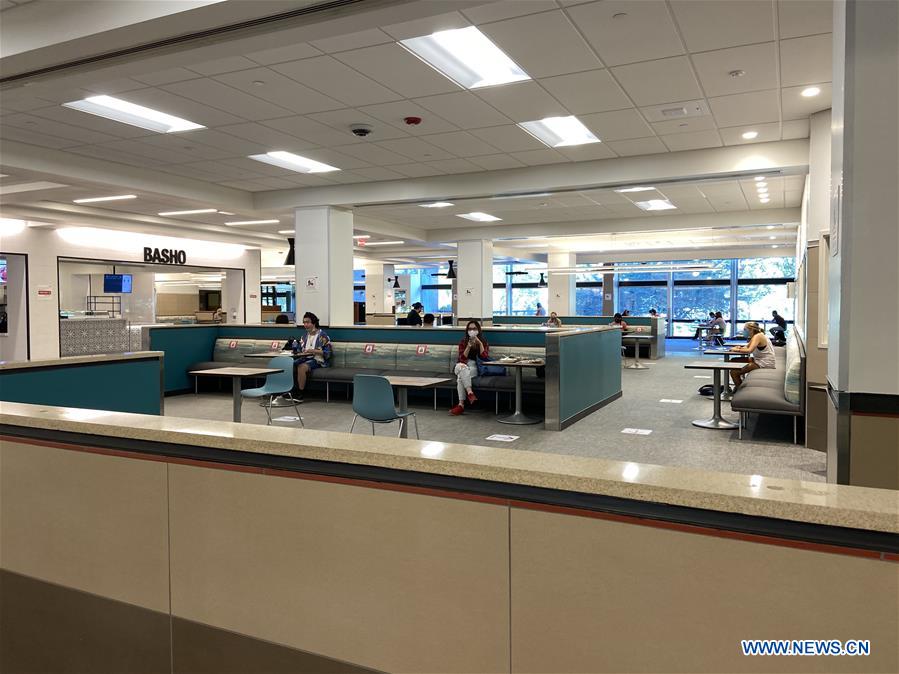
People sit in a spaced-out dining area at Boston University, Boston, Massachusetts, the United States, on Sept. 4, 2020. While many U.S. colleges including its prestigious neighbor across the Charles River, Harvard University, have started the fall semester fully online, Boston University (BU) found itself going the extra mile to ensure all the students who chose to live on campus under a hybrid learning mode are safe and healthy. (Photo by Wu Tongyangzi/Xinhua)
Prev 1 2 3 4 5 6 Next Prev 1 2 3 4 5 6 Next
Video PlayerClose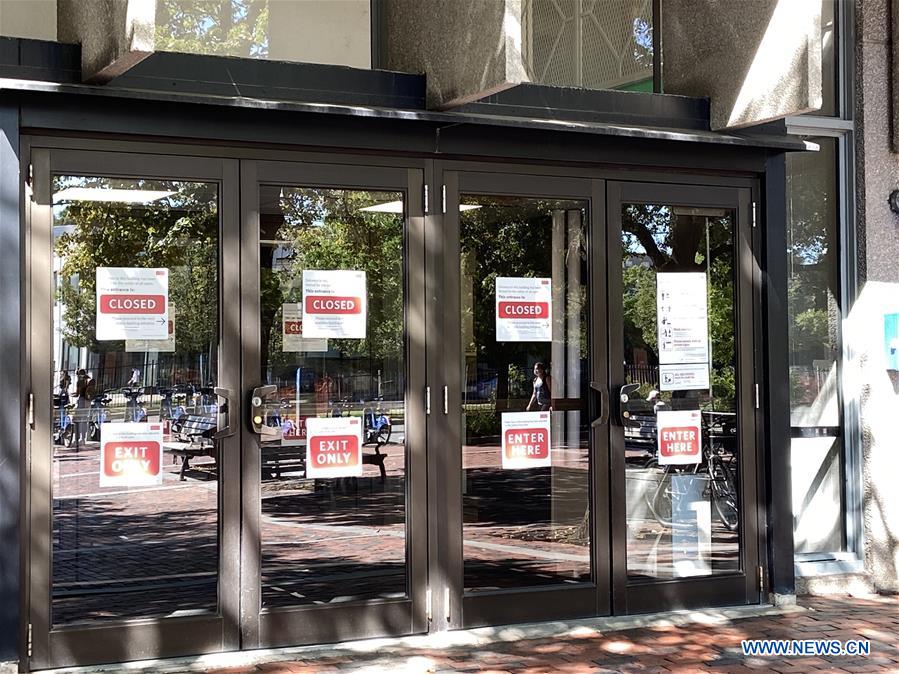
Signs of measures against COVID-19 are seen on the doors of the George Sherman Union (of students) at Boston University, Boston, Massachusetts, the United States, on Sept. 4, 2020. While many U.S. colleges including its prestigious neighbor across the Charles River, Harvard University, have started the fall semester fully online, Boston University (BU) found itself going the extra mile to ensure all the students who chose to live on campus under a hybrid learning mode are safe and healthy. (Photo by Wu Tongyangzi/Xinhua)
Prev 1 2 3 4 5 6 Next Prev 1 2 3 4 5 6 Next
Video PlayerClose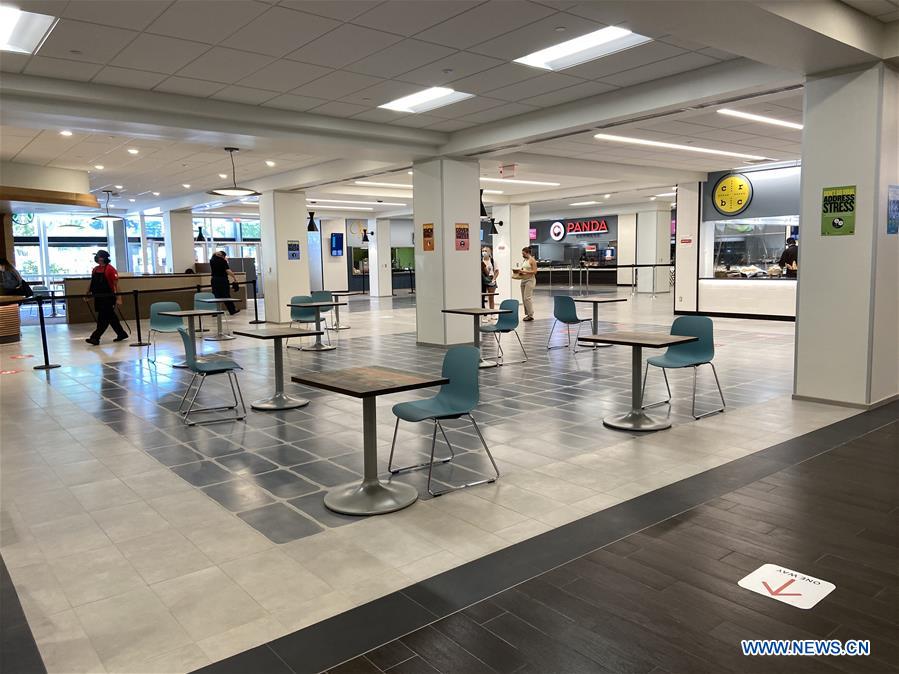
A spaced-out dining area is seen at Boston University, Boston, Massachusetts, the United States, on Sept. 4, 2020. While many U.S. colleges including its prestigious neighbor across the Charles River, Harvard University, have started the fall semester fully online, Boston University (BU) found itself going the extra mile to ensure all the students who chose to live on campus under a hybrid learning mode are safe and healthy. (Photo by Wu Tongyangzi/Xinhua)
Prev 1 2 3 4 5 6 Next Prev 1 2 3 4 5 6 Next
Video PlayerClose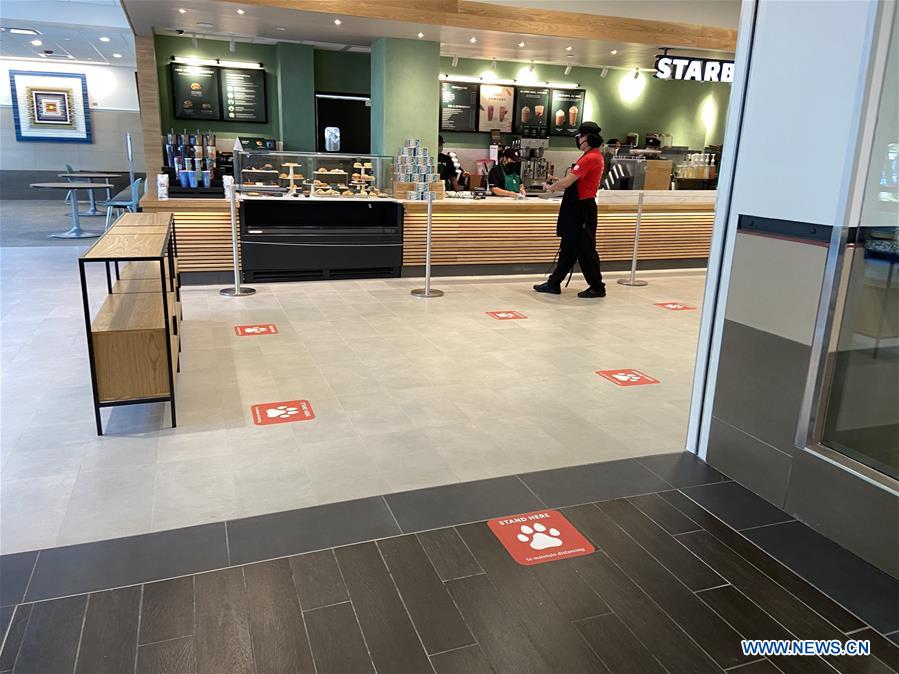
Physical distancing marks for queue lines are seen in the George Sherman Union (of students) at Boston University, Boston, Massachusetts, the United States, on Sept. 4, 2020. While many U.S. colleges including its prestigious neighbor across the Charles River, Harvard University, have started the fall semester fully online, Boston University (BU) found itself going the extra mile to ensure all the students who chose to live on campus under a hybrid learning mode are safe and healthy. (Photo by Wu Tongyangzi/Xinhua)
Prev 1 2 3 4 5 6 Next Prev 1 2 3 4 5 6 Next
Video PlayerClose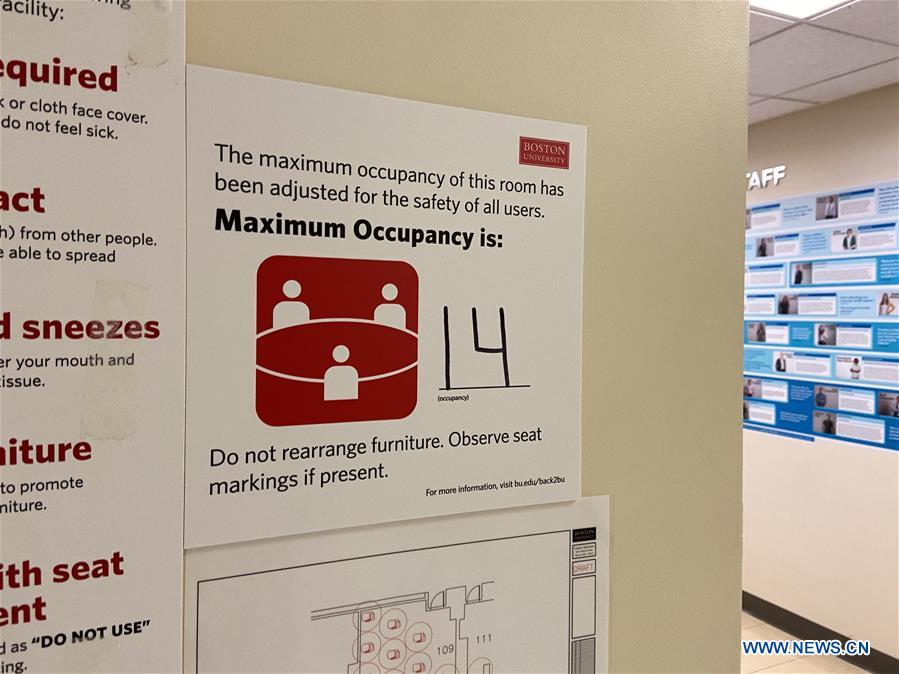
A sign for reduced occupancy in classrooms is seen on a wall at Boston University, Boston, Massachusetts, the United States, on Sept. 4, 2020. While many U.S. colleges including its prestigious neighbor across the Charles River, Harvard University, have started the fall semester fully online, Boston University (BU) found itself going the extra mile to ensure all the students who chose to live on campus under a hybrid learning mode are safe and healthy. (Photo by Wu Tongyangzi/Xinhua)
Prev 1 2 3 4 5 6 Prev 1 2 3 4 5 6
